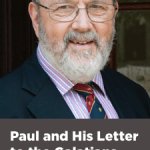Last year at ETS, one of the best papers I heard was by Zach Dawson on genre with a view to challenging Richard Burridge’s view of genre in relation to Gospels.
Anyway, Zach’s paper is now published at the on-line journal Biblical and Ancient Greek Linguistics with open access.
McMaster Divinity College, Hamilton, Ontario
A wave of research that began in the late 1970s and culminated with Richard Burridge’s What Are the Gospels? in 1992 effectively established the consensus that the Gospels are to be classified as ancient βίοι. In this article, I respond to Burridge’s work to demonstrate that his approach to genre is problematic in several ways, which calls the foundation of the current consensus into question. Following this ground clearing exercise, I articulate a way forward in how to understand the relationship between the Gospels’ genre and their social purpose, which is more in keeping with modern genre theory, especially as it is envisioned by systemic-functional linguists. The last section of the article then demonstrates the potential benefits of using Systemic Functional Linguistics genre theory by means of a sample genre analysis of the Lord’s Prayer in Matt 6:7–13, which demonstrates how to understand the social function of genres and opens an avenue for fresh research into the question of Gospel genres.
Keywords: genre theory, genre criticism, gospels, Systemic Functional Linguistics, register, βίος, ancient biography
Dawson concludes: ‘From a SFL perspective, when we ask “What are the Gospels?” we are actually asking “What are the social goals of the Gospels?” This is a fundamentally different way of thinking about genre than has previously been explored in Gospel studies.”












